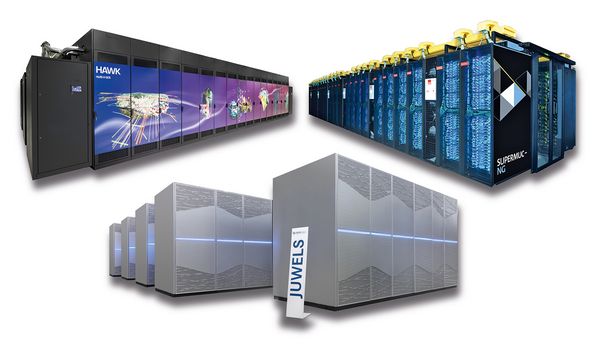NEWSFLASHES
GCS Awards 1.4 Billion Core Hours as Part of the 26th Large-Scale Call
Newsflash 13/2021 –
On November 1, the Gauss Centre for Supercomputing (GCS) Scientific Steering Committee selected 15 scientific projects for large-scale allocations on Germany’s leading high-performance computing (HPC) resources. The awardees, part of GCS’s 26th Large-Scale Call, come from fields ranging from chemistry to high-energy physics.
Several principal investigators were awarded large-scale allocations for the first time. Prof. Andreas Pöppl from the University of Leipzig received 53 million hours on the Leibniz Supercomputing Centre’s (LRZ’s) SuperMUC-NG system for his project, “Ab-initio modelling of paramagnetic active sites in Zeolites and giant Metal-Organic Frameworks.” Prof. Andrea Beck from the University of Stuttgart and the University of Magdeburg received 120 million core hours on the High-Performance Computing Center Stuttgart’s (HLRS’s) Hawk system for her project, “Large Eddy Simulation of Complex Boundary Layer Flows with Interactions.” Prof. Jochen Heitger at the University of Münster received 80 million core hours on SuperMUC-NG for his project, “Non-perturbative Heavy Quark Effective Theory.”
Of the 15 projects, six were awarded time on the Jülich Supercomputing Centre’s (JSC’s) JUWELS modular supercomputing system. Five projects will be supported with time on HLRS’s Hawk system, and four projects will be running on LRZ’s SuperMUC-NG system.
For a full list of awardees, please click here.
About GCS Large-Scale Projects:
In accordance with the mission of the Gauss Centre for Supercomputing, all scientists and researchers in Germany are eligible to apply for computing time on the petascale HPC systems of Germany’s leading supercomputing institution. Projects are classified as "large-scale" if they require more if they require at least 100 Mcore-h on Hawk, 45,000 EFLOP on JUWELS, or 45 Mcore-h on SuperMUC-NG. These values correspond to 2% of the systems’ annual production in terms of estimated availability. Computing time on the GCS systems is allocated by the GCS Scientific Steering Committee to scientifically leading, ground-breaking projects which deal with complex, demanding, and innovative simulations that would not be possible without the GCS petascale infrastructure. The projects are evaluated via a strict peer-review process on the basis of the projects' scientific and technical excellence.
The GCS Calls for Large-Scale Projects application procedure and criteria for decision are described in detail here.
About GCS: The Gauss Centre for Supercomputing (GCS) combines the three national supercomputing centres, HLRS (High-Performance Computing Center Stuttgart), JSC (Jülich Supercomputing Centre), and LRZ (Leibniz Supercomputing Centre, Garching near Munich) into Germany’s Tier-0/1 supercomputing institution. Together the three centres provide the largest and most powerful supercomputing infrastructure in all of Europe and serve a wide range of industrial and research activities across various disciplines. They also provide top-tier training and education for the national as well as the European high-performance computing (HPC) community. GCS is the German member of PRACE (Partnership for Advanced Computing in Europe), an international non-profit association consisting of 26 member countries, whose representative organizations create a pan-European supercomputing infrastructure, providing access to computing and data management resources and services for large-scale scientific and engineering applications at the highest performance level.
GCS is jointly funded by the German Federal Ministry of Education and Research and the federal states of Baden-Württemberg, Bavaria and North Rhine-Westphalia. It has its headquarters in Berlin/Germany.
